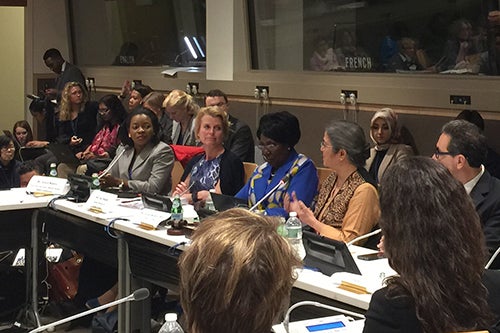News
Reproductive rights realized for too few women and girls
- 11 March 2015
News
UNITED NATIONS, New York – For 20 years, the international community has agreed that reproductive rights are critical to global development. Yet these rights remain tragically unfulfilled for millions of women and girls. This was the central message at a panel discussion held yesterday at United Nations Headquarters in New York, during the annual Commission on the Status of Women.
“I see girls married off at 10,” said UNFPA Executive Director Dr. Babatunde Osotimehin, at the start of the event. “I see female genital mutilation. I see women being excluded from the workplace, people not being able to go to school, discrimination based on gender, and gender-based violence around the world.”
Each day, nearly 800 women die from causes related to pregnancy and childbirth; the vast majority of these deaths are preventable. Every day, some 37,000 girls are married off before they reach age 18.
Globally, one in three women are victims of gender-based violence, and about 225 million women who want to use safe and effective methods of family planning are unable to do so because they lack access to information, services, or the support of their partners or communities.

These are violations of women’s and girls’ reproductive rights – the rights to decide the number, spacing and timing of one’s children, to make these decisions without violence or coercion, to access the information and means to exercise these choices, and to attain the highest standard of sexual and reproductive health.
These rights are essential for global sustainable development, Dr. Osotimehin noted.
When women can choose freely when, and whether, to marry and have children, they are more successful educationally, economically and socially. And their children are healthier and better educated, helping to break the cycle of poverty.
But an enormous gap exists between the rights recognized at the global level and the fulfilment of these rights within communities.
Grace Malera of the Malawi Human Rights Commission showed how rights affirmed in law can be translated into action on the ground.
“We have the Maputo Protocol, the Maputo Action Plan, a progressive constitution,” she said, referring to legal instruments that guarantee the rights of women. “We have a Prevention of Domestic Violence Act. We have a Gender Equality Act.”
But officials in Malawi needed clear view of how these policies were being implemented – and if they were at all, she said.
“With the financial and technical support of UNFPA, we conducted a public inquiry into the status of reproductive rights in Malawi and found there were many violations of reproductive rights… There is a very big gap between what we have in laws and policies and what should happen on the ground… This is not the case in Malawi only,” Ms. Malera emphasized.
“We have one of highest rates of maternal mortality, neonatal deaths and infant mortality, and a high prevalence of HIV and AIDS.” Malawi has the 16th highest maternal mortality rate in the world, according to recent estimates.
But, crucially, the study also revealed major reasons behind these gaps.
“Some causes are structural,” Ms. Malera said. For example, “women experience barriers in accessing sexual and reproductive health services because of long distances to health facilities, which leads to women giving birth outside of health facilities.”
“These findings are informing a lot of interventions,” Ms. Malera said.
In one such activity, the Malawi Human Rights Commission, with support from UNFPA, held awareness-raising sessions about the Gender Equality Act for district officials, ensuring local leaders are fully informed of the law.
Such community-level efforts are key to making reproductive rights a reality for all people.
Affirming these rights at the international level is important, Dr. Osotimehin said, but “how these rights translate to what we do on the ground matters more.”